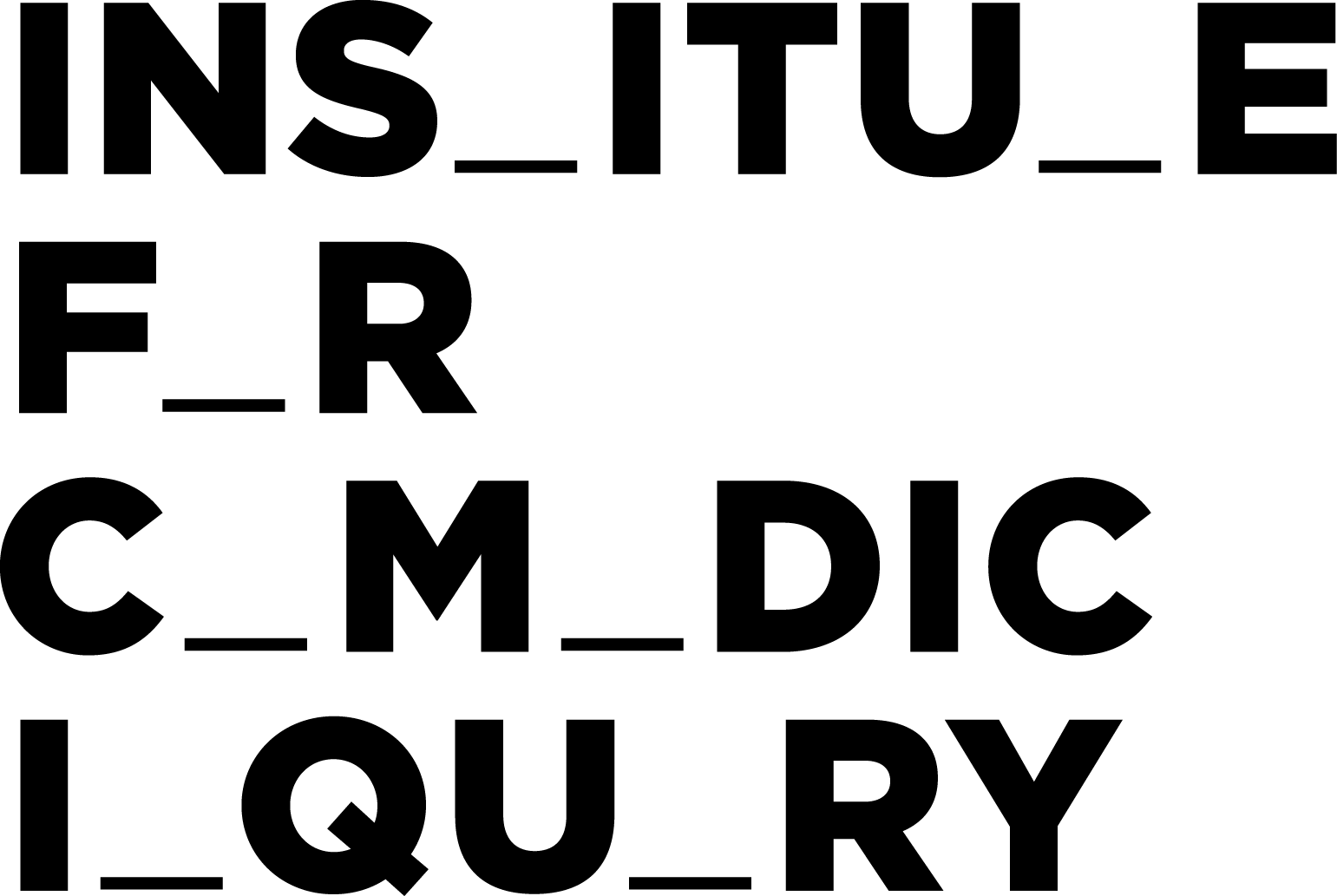hümr 2.0
What if laughing together was the new swipe right?
An online humor typing quiz and interviews with scientists studying humor and relationships.
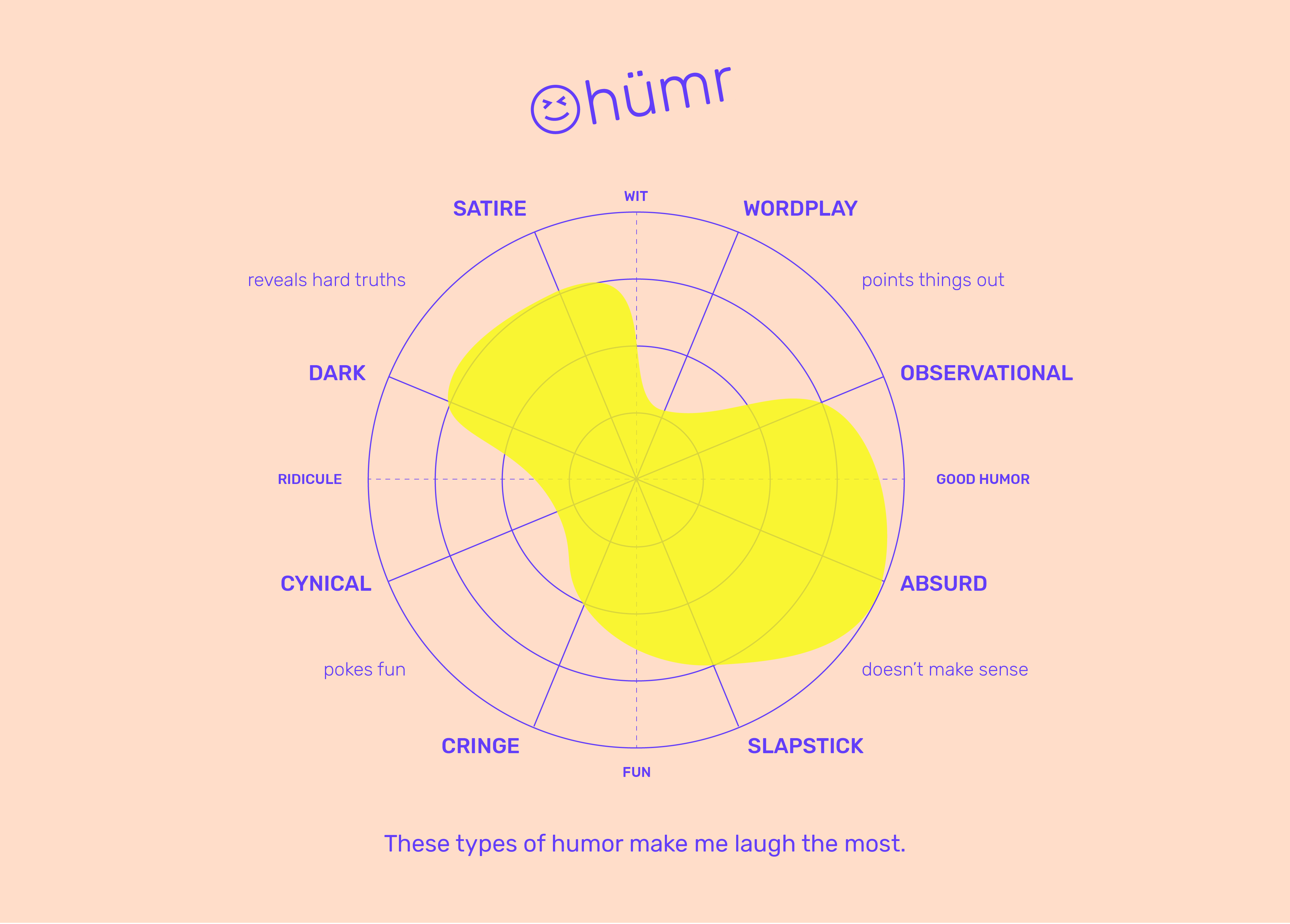



When looking for love, people often say they want to meet someone with a good sense of humor.
Right now, the booming industry of dating apps brokering our relationships are doing so with appearance-first algorithms. Are they leading us astray? What if creating inside jokes together was a stronger signal of long-term compatibility?
We may be right to put humor high on our list of desirable qualities; after all, what makes us laugh is a reflection of our deepest-held beliefs. When we share a laugh with someone, we reveal our like-mindedness and that can be attractive. Looking beyond initial attraction, three decades of humor research shows that creating humor together plays an important role in long-term relationship satisfaction.
Are you looking for love? Find out your hümr type and experiment with going on a humor-first date.
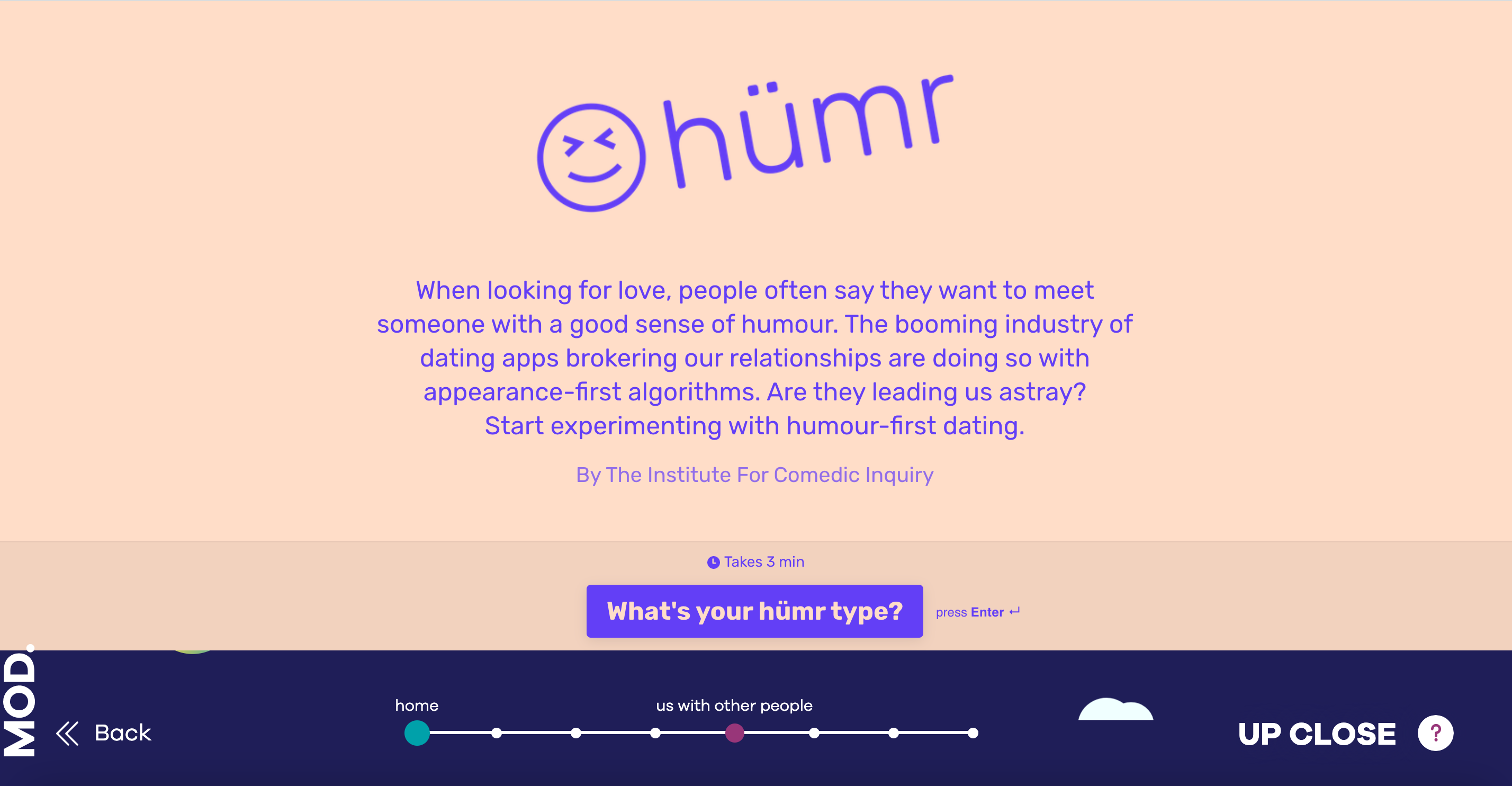
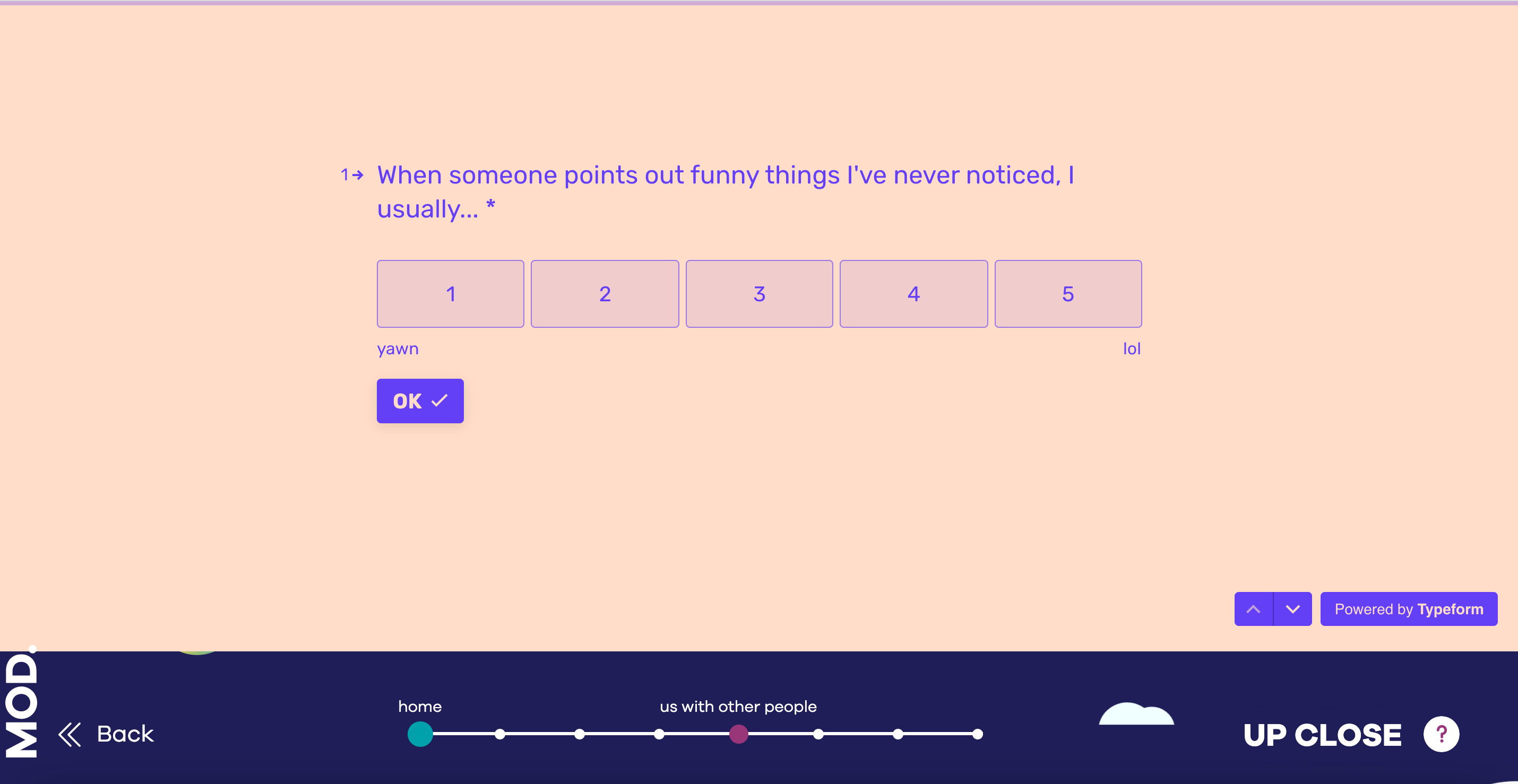
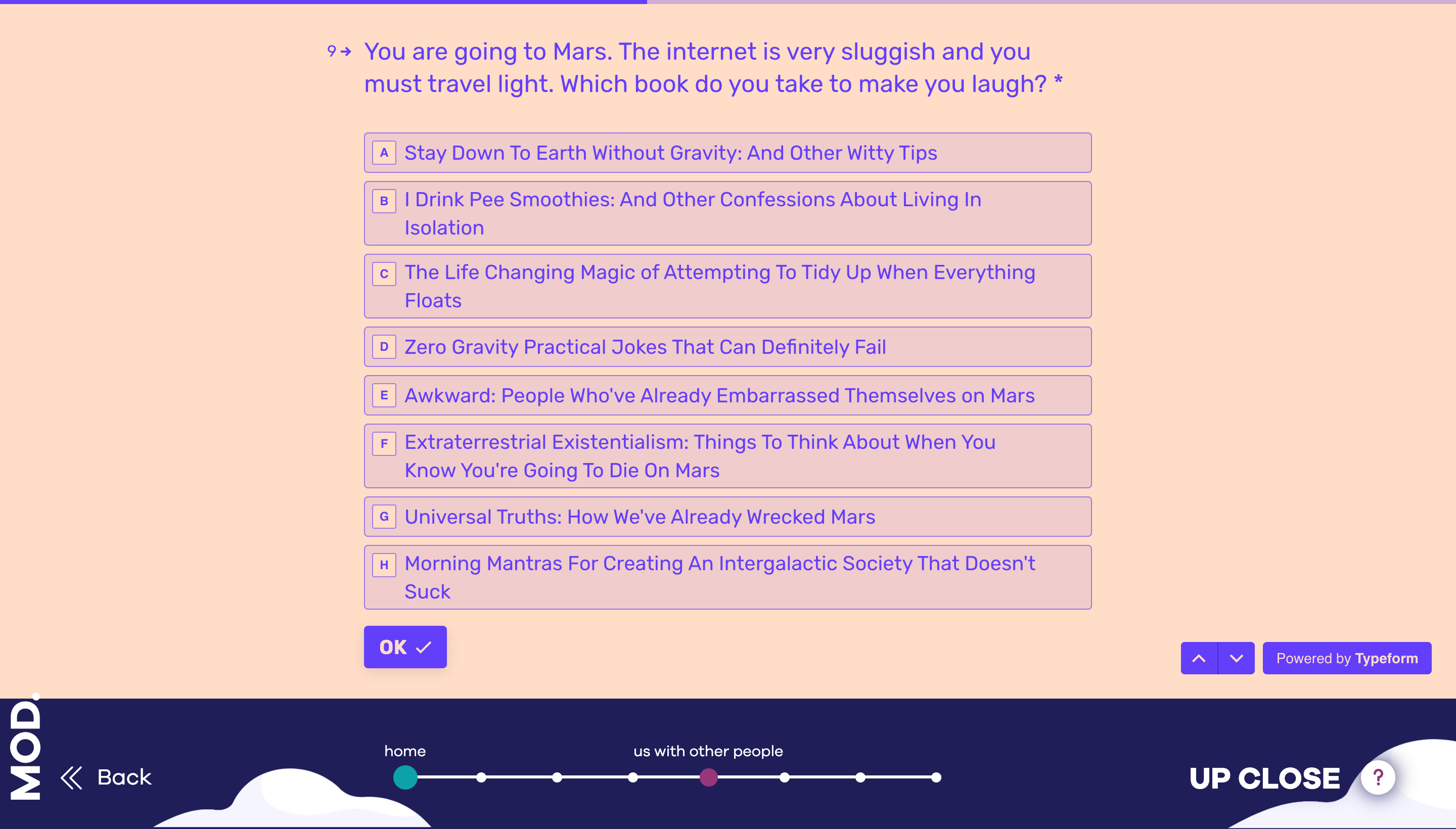

How To Read Your hümr Chart
It’s common to have a mix of hümr types. You might have evenly dispersed types, but if you have a dominant hümr type, you’ll notice it’s where your blob stretches most towards the edges of the chart.
Looking for a date? If you have a clearly dominant hümr type, seek out people who share it. You don’t need to have perfect overlap with them, but if your preferences lean towards a particular side of the chart, use that as your guidance. If you have an evenly dispersed set of hümr types, just follow your mood on the day you are looking to make a match.
What’s most important is that you and your date can create humor together. That can happen across any hümr style. Try going on one of the suggested hümr dates and make it your aim to build humor together. Treat it like an experiment and see what happens!

Artist’s Essay On hümr
Written in September 2020 on the occasion of hümr being included in the online exhibition UP CLOSE at MOD, University of South Australia.
Artist Introduction
Laura Allcorn is an artist and humorist. She founded The Institute For Comedic Inquiry—an artist-led research group that studies humor and creates comedic experiments. Through her work, she explores the role humor plays in our social interactions and how we process complexities. Her work has been shown at The V&A, Science Gallery Dublin, and CCCB. You can learn more about her work at comedicinquiry.com.
What is hümr?
We use humor as a shortcut to get to know people and gauge if we are like-minded. I find it important to all of my relationships, whether friendly or romantic. I met my partner performing improv comedy, so he and I often find ourselves coming up with inside jokes that only we would understand.
Most of the people I know who are using dating apps, especially those that are appearance-first, are not having the best time or much success. People often say they want to meet someone with a good sense of humor. So I started to get curious about experimenting with matchmaking based on shared humor sensibilities. It also just sounded like a fun approach to dating. As I was creating this project I came upon some research by Jeffrey A. Hall, a Professor of Communication Studies at the University of Kansas. He found that our ability to create humor together was one of the strongest indicators of long-term relationship satisfaction.
I think of hümr as an experiment—an invitation for people to explore the role humor plays in their attraction and relationships.
The hümr quiz evaluates you across eight types and is based on the latest research in categorizing humor styles. The questions focus on two facets of your humor sensibilities— preferences and your ability to produce humor in that style. Both are important to how we might interact with someone and create humor together.
Your custom hümr chart will show your results across the eight possible types. That’s important because while you may have a favorite type, it’s likely that in your social interactions you are using many styles of humor. You probably don't walk around only rattling off puns or sarcastic comments—you naturally calibrate the style of humor you use for the situation and the person you are encountering.
You can share your hümr chart to seek out potential dates. If you are looking for love, you might consider subverting your dating apps by posting this as your profile image. You could try texting, emailing, or sharing your hümr chart on social media to start conversations with people who share some of your humor sensibilities.
Once you’ve made a match, you can set up a hümr date. There are three proposed activities to choose from for each hümr type. Pick one in a hümr type you both share. The idea is to avoid asking each other cliche questions and to let humor lead your interaction. The activities invite you to try building humor together. In the process you’ll likely start revealing some of your values, beliefs, and worldviews too. If you can share a laugh together or even create an inside joke, there just might be second date potential.
This is an active field of research which is what makes it so curious. While creating this project I interviewed scientists who study humor and relationships. I hope you enjoy reading their insights and exploring the role humor plays in your relationships.
Your custom hümr chart will show your results across the eight possible types. That’s important because while you may have a favorite type, it’s likely that in your social interactions you are using many styles of humor. You probably don't walk around only rattling off puns or sarcastic comments—you naturally calibrate the style of humor you use for the situation and the person you are encountering.
You can share your hümr chart to seek out potential dates. If you are looking for love, you might consider subverting your dating apps by posting this as your profile image. You could try texting, emailing, or sharing your hümr chart on social media to start conversations with people who share some of your humor sensibilities.
Once you’ve made a match, you can set up a hümr date. There are three proposed activities to choose from for each hümr type. Pick one in a hümr type you both share. The idea is to avoid asking each other cliche questions and to let humor lead your interaction. The activities invite you to try building humor together. In the process you’ll likely start revealing some of your values, beliefs, and worldviews too. If you can share a laugh together or even create an inside joke, there just might be second date potential.
This is an active field of research which is what makes it so curious. While creating this project I interviewed scientists who study humor and relationships. I hope you enjoy reading their insights and exploring the role humor plays in your relationships.
Interview with Jeffrey A. Hall
Conducted by Laura Allcorn in September 2020 on the occasion of hümr being included in the online exhibition UP CLOSE at MOD at the University of South Australia.
Scientist Introduction
Jeffrey A. Hall (PHD) is a Professor of Communication Studies at the University of Kansas. His research interests include: Courtship and Flirting, Humor in Relationships, and Mobile and Social Media. His study entitled Humor in Romantic Relationships: A Meta-analysis offers insight into shared laughter as a dimension of successful long-term relationships.
1. You’ve studied the role shared humor and laughter plays in long term relationship satisfaction. How do you define relational humor?
Shared humor or relational humor can be described as when I say something that happened in my day and I want to tell my partner because I think it's funny. Another example could be that we watch Simpsons together for years and then we create a set of inside jokes in references to the things we shared together. It’s really where we find things that are idiomatic or special in the way we talk to each other. It is also demonstrated in how we can make jokes or asides when we are in a group of other people, and we can smile at each other because we know what our partner meant, even if there are other people in the group. That's relational humor. It's a layered approach of all these things that you begin to share with your partner.
What is interesting about relational humor is it was probably the best predictor of satisfaction that wasn't an evaluative statement like ‘They have a good sense of humor.’ Instead, it’s descriptive of what you do together as a practice or as a behavior—that's what matters.
2. Why is humor and shared laughter important to long term relationship satisfaction?
I think we're just barely starting to understand how this works. This research is multidisciplinary and not a lot of people are dedicated to studying it, so as a consequence it’s taking a long time for research to get to an idea what the pathways are.
It seems as though humor has three pathways. One pathway is about security or the sense of a shared understanding of the world. So when people who are close to me and I laugh together about something, it pleases me because I feel my understanding of the world is shared by other people, and the closer those people are to me, the more secure I feel in my own ability to play with an idea or express a taboo or say stuff that is weird or quirky or inappropriate. I know that the other person would also find it fun to do that so it makes me feel safe. That’s the safety pathway; it is related to the idea of having a shared worldview.
The second pathway is coping, which is you're having a tough day and I help you laugh about it. If you're taking something seriously, I could try and help you think it through. A self-deprecating person can laugh at themselves and their partner can help them enjoy that rather than be too hard on themselves. A sarcastic person can point out how stupid the entire world is and the other person can help them feel that way. The coping pathway is really healthy because it diminishes the negative and lifts the positive; you replace the negative emotion with a positive one.
Finally, there’s the third pathway and it’s related to joy. There is some reason to believe that joy in its own right is good for your health, your body, and your being. It makes it more fun to spend time with people when other people around are laughing with you. So if you think about it in terms of security, coping, and joy—that's the answer to your question about why humor is important for a long-term relationship.
3. The hümr quiz is a self-assessment tool and sometimes others have different perceptions of our humor sensibilities. In your research findings, you mention that ‘partner-perceived humor is likely to have a stronger association with satisfaction than self-reported humor.’ Can you share more about that idea?
You can think of evaluating the role of humor in relationships across three levels. Level one is me within me. So, when I think about my own sense of humor or humor style preferences. The second level is what I think about a potential partner. In other words, it’s my perception of their sense of humor. So, my evaluation of my partner matters more than what she thinks about herself for my satisfaction. The third level is what we do together—the inside jokes and relational humor we create.
The first level, the self, is a little predictive of satisfaction. The second level, which is what I think about you, is more predictive of satisfaction. But the third level, what we do together—that’s the one that’s most strongly associated with satisfaction.
4. What's something surprising that you learned from your research?
The meta-analysis really shows that it's what happens within the relationship that predicts satisfaction, not your own style. I started out thinking that people who have certain types of humor, like affiliative, would be happier in their relationships. What the meta-analysis suggested was it’s the type of humor that you build in your relationship that matters. It's not your style; it's the building of your style with another person or a certain routine in your communication. It is also content free. There's nothing about your style, sense, or the topic that defines a shared sense of relational humor.
5. What is something you’d still like to learn about the role humor plays in the success of long term romantic relationships?
One of the biggest missing pieces of humor relationship research is an objective measure of an ability to create humor and its association with attraction. So, think of it this way, there are many reasons people laugh and not all of them are because something is funny. There are also a lot of people who will self-report their sense of humor, which is the most traditional way to do so in social science, but let's be honest, no one really admits they don't have a sense of humor.
6. What do you think about the role technology and specifically appearance-first apps play in brokering our relationships?
When I was studying courtship, what became pretty clear is that people self-select both the environment and the dating app apps that they pursue based on the kind of relationship they want to have. The most dominant aspect of Tinder is really that it's a game. It feels good that people want to swipe right for you. I'm very loath to ever speak poorly of people who use attraction-based apps for the sake of having fun. They kind of understand that the physical part of what they're doing there is the fun in looking attractive and having people affirm it. So I get that. Is it the most successful pathway to finding a romantic partner? Probably not, but I also don't think it's meant for that. The research suggests that if we are only making judgments based upon people’s physical attraction or physical attractiveness from their photos first, it's a pretty poor indicator of how successful we're going to be in a relationship.
You can think of evaluating the role of humor in relationships across three levels. Level one is me within me. So, when I think about my own sense of humor or humor style preferences. The second level is what I think about a potential partner. In other words, it’s my perception of their sense of humor. So, my evaluation of my partner matters more than what she thinks about herself for my satisfaction. The third level is what we do together—the inside jokes and relational humor we create.
The first level, the self, is a little predictive of satisfaction. The second level, which is what I think about you, is more predictive of satisfaction. But the third level, what we do together—that’s the one that’s most strongly associated with satisfaction.
4. What's something surprising that you learned from your research?
The meta-analysis really shows that it's what happens within the relationship that predicts satisfaction, not your own style. I started out thinking that people who have certain types of humor, like affiliative, would be happier in their relationships. What the meta-analysis suggested was it’s the type of humor that you build in your relationship that matters. It's not your style; it's the building of your style with another person or a certain routine in your communication. It is also content free. There's nothing about your style, sense, or the topic that defines a shared sense of relational humor.
5. What is something you’d still like to learn about the role humor plays in the success of long term romantic relationships?
One of the biggest missing pieces of humor relationship research is an objective measure of an ability to create humor and its association with attraction. So, think of it this way, there are many reasons people laugh and not all of them are because something is funny. There are also a lot of people who will self-report their sense of humor, which is the most traditional way to do so in social science, but let's be honest, no one really admits they don't have a sense of humor.
6. What do you think about the role technology and specifically appearance-first apps play in brokering our relationships?
When I was studying courtship, what became pretty clear is that people self-select both the environment and the dating app apps that they pursue based on the kind of relationship they want to have. The most dominant aspect of Tinder is really that it's a game. It feels good that people want to swipe right for you. I'm very loath to ever speak poorly of people who use attraction-based apps for the sake of having fun. They kind of understand that the physical part of what they're doing there is the fun in looking attractive and having people affirm it. So I get that. Is it the most successful pathway to finding a romantic partner? Probably not, but I also don't think it's meant for that. The research suggests that if we are only making judgments based upon people’s physical attraction or physical attractiveness from their photos first, it's a pretty poor indicator of how successful we're going to be in a relationship.
Interview with Kathi Diel
Conducted by Laura Allcorn in September 2020 on the occasion of hümr being included in the online exhibition entitled UP CLOSE at MOD, University of South Australia
Scientist Introduction
Kathi Diel is a Doctoral Researcher in Social Psychology at Ruhr University Bochum in Germany. Her research interests include: Social Comparison, Self-Regulation, Humor, Person Perception, and Empathy. Her study entitled Funnily enough, I feel like I know you! On the affiliative and diagnostic functions of sharing the same humor found that humor preference is a strong indicator of attraction and like-mindedness when meeting a stranger.
1. Why are we so attracted to those who are like-minded or similar to us?
There are actually a number of reasons why we like people who are similar to us. First of all, being around others who are similar seems rewarding. For instance, if we meet another person who shares our attitudes, hobbies or values, we can be more confident in our own attitudes, beliefs and likes: If they like, think, or feel it too, it must be right!
Second, if you share a certain feature with someone, especially if that feature is more unique, you can also assume that you might share other features or interests as well. That means some similarities can be very diagnostic of how similar two people are in general. And of course, it’s just more fun to be around people who like the same things as we do.
2. What does sharing the same sense of humor tell us about someone in the early stages of meeting them?
Humor is already a great tool when it comes to identifying similar others. A person can joke about any subject and if the other person responds with laughter, they can be sure the other person agrees.
Sometimes humor can be very complex, meaning in order to understand a humorous situation, comment or joke, certain background knowledge is necessary and thus, people can assume that this background knowledge is shared among those who “get” the joke–meaning they can assume that they and the other person are like-minded or they see the world with similar eyes.
If humor is shared it can imply a very high degree of similarities between two strangers, meaning people perceive humor as very diagnostic of who a person is. If two people laugh about the same things, humor works as a kind of fingerprint of the mind, a signal that “this person gets me”.
3. In your study you had strangers share their humor, food and music preferences. Of those, you found humor was the strongest indicator of like-mindedness. Why do you think that is?
We think that music and especially food preferences are more homogeneous in the population. For instance, if you’re at a party where you meet new people, it is very likely that another person also likes pizza (who doesn’t?). But a person who shares your sense of humor might be more rare to find.
This is what we found in our studies: Participants are more attracted to a stranger who shared their humor preferences compared to a stranger who shared their food or music preferences. They were also more confident in making inferences about a person’s other interests if that person shared their sense of humor.
4. What's something surprising that you learned from your research?
It was actually not too surprising, but we also found that a stranger was liked even less if they did not agree on their sense of humor compared to a person who did not share their food preference. That means, it might be easier for people to tolerate any disagreements on food preferences, but not so much if it comes to humor.
5. What’s something you’d still like to learn about the role humor plays when meeting someone new, whether that’s a friend or a potential romantic partner?
Similar to your work Laura, I am also very curious about authentic vs. fake laughter and their role in social interactions. Research has shown that especially authentic laughter is very hard to fake, which should also play an important role in friendship formation and dating. For example, it might be easier to forgive when someone pretends to like certain food, but not if someone fakes their laugher in order to be liked by the other person.
6. What role do you think humor could play in match making?
Beyond the diagnostic functions of humor I’ve already mentioned, humor is a great tool to break the ice between strangers or potential romantic candidates.
While first encounters or chats (if we’re talking about dating apps) can be very awkward, humor (when shared!) can actually facilitate the start of a conversation and take away the awkwardness. I imagine everyone can remember a situation (or even a date) where maybe there was no match in humor, which of course makes the whole situation even more uncomfortable.
We think that music and especially food preferences are more homogeneous in the population. For instance, if you’re at a party where you meet new people, it is very likely that another person also likes pizza (who doesn’t?). But a person who shares your sense of humor might be more rare to find.
This is what we found in our studies: Participants are more attracted to a stranger who shared their humor preferences compared to a stranger who shared their food or music preferences. They were also more confident in making inferences about a person’s other interests if that person shared their sense of humor.
4. What's something surprising that you learned from your research?
It was actually not too surprising, but we also found that a stranger was liked even less if they did not agree on their sense of humor compared to a person who did not share their food preference. That means, it might be easier for people to tolerate any disagreements on food preferences, but not so much if it comes to humor.
5. What’s something you’d still like to learn about the role humor plays when meeting someone new, whether that’s a friend or a potential romantic partner?
Similar to your work Laura, I am also very curious about authentic vs. fake laughter and their role in social interactions. Research has shown that especially authentic laughter is very hard to fake, which should also play an important role in friendship formation and dating. For example, it might be easier to forgive when someone pretends to like certain food, but not if someone fakes their laugher in order to be liked by the other person.
6. What role do you think humor could play in match making?
Beyond the diagnostic functions of humor I’ve already mentioned, humor is a great tool to break the ice between strangers or potential romantic candidates.
While first encounters or chats (if we’re talking about dating apps) can be very awkward, humor (when shared!) can actually facilitate the start of a conversation and take away the awkwardness. I imagine everyone can remember a situation (or even a date) where maybe there was no match in humor, which of course makes the whole situation even more uncomfortable.
2020-PRESENT
Commissioned for UP CLOSE, online exhibition at MOD. (Museum of Discovery) at University of South Australia.
Are you ready to get up close?
There is no better way to get to know someone than snooping through their bedroom. UP CLOSE is an exploration of a spectrum of closeness. Starting inside our bodies, we consider touch and relationships with people and machines before spanning out to the way we move through place and space.
UP CLOSE straddles the real world and online divide. Most of the exhibits are waiting for you here, but there are some in the galleries at MOD. and some that you can participate in wherever you find yourself.
You can get close here from 30 August 2021 – 31 January 2022. It looks and feels best on desktop, but we’ll understand if you want to use your phone. Now… are you ready to get up close?
Commissioned for UP CLOSE, online exhibition at MOD. (Museum of Discovery) at University of South Australia.
Are you ready to get up close?
There is no better way to get to know someone than snooping through their bedroom. UP CLOSE is an exploration of a spectrum of closeness. Starting inside our bodies, we consider touch and relationships with people and machines before spanning out to the way we move through place and space.
UP CLOSE straddles the real world and online divide. Most of the exhibits are waiting for you here, but there are some in the galleries at MOD. and some that you can participate in wherever you find yourself.
You can get close here from 30 August 2021 – 31 January 2022. It looks and feels best on desktop, but we’ll understand if you want to use your phone. Now… are you ready to get up close?
CREDITS
Artist - Laura Allcorn
Researcher - Jeffrey A. Hall (PHD) is a Professor of Communication Studies at the University of Kansas. Interviewed for hümr. His research interests include: Courtship and Flirting, Humor in Relationships, and Mobile and Social Media. His study entitled Humor in Romantic Relationships: A Meta-analysis offers insight into shared laughter as a dimension of successful long-term relationships.
Researcher - Kathi Diel is a Doctoral Researcher in Social Psychology at Ruhr University Bochum in Germany. Interviewed for hümr. Her research interests include: Social Comparison, Self-Regulation, Humor, Person Perception, and Empathy. Her study entitled Funnily enough, I feel like I know you! On the affiliative and diagnostic functions of sharing the same humor found that humor preference is a strong indicator of attraction and like-mindedness when meeting a stranger.
Artist - Laura Allcorn
Researcher - Jeffrey A. Hall (PHD) is a Professor of Communication Studies at the University of Kansas. Interviewed for hümr. His research interests include: Courtship and Flirting, Humor in Relationships, and Mobile and Social Media. His study entitled Humor in Romantic Relationships: A Meta-analysis offers insight into shared laughter as a dimension of successful long-term relationships.
Researcher - Kathi Diel is a Doctoral Researcher in Social Psychology at Ruhr University Bochum in Germany. Interviewed for hümr. Her research interests include: Social Comparison, Self-Regulation, Humor, Person Perception, and Empathy. Her study entitled Funnily enough, I feel like I know you! On the affiliative and diagnostic functions of sharing the same humor found that humor preference is a strong indicator of attraction and like-mindedness when meeting a stranger.
